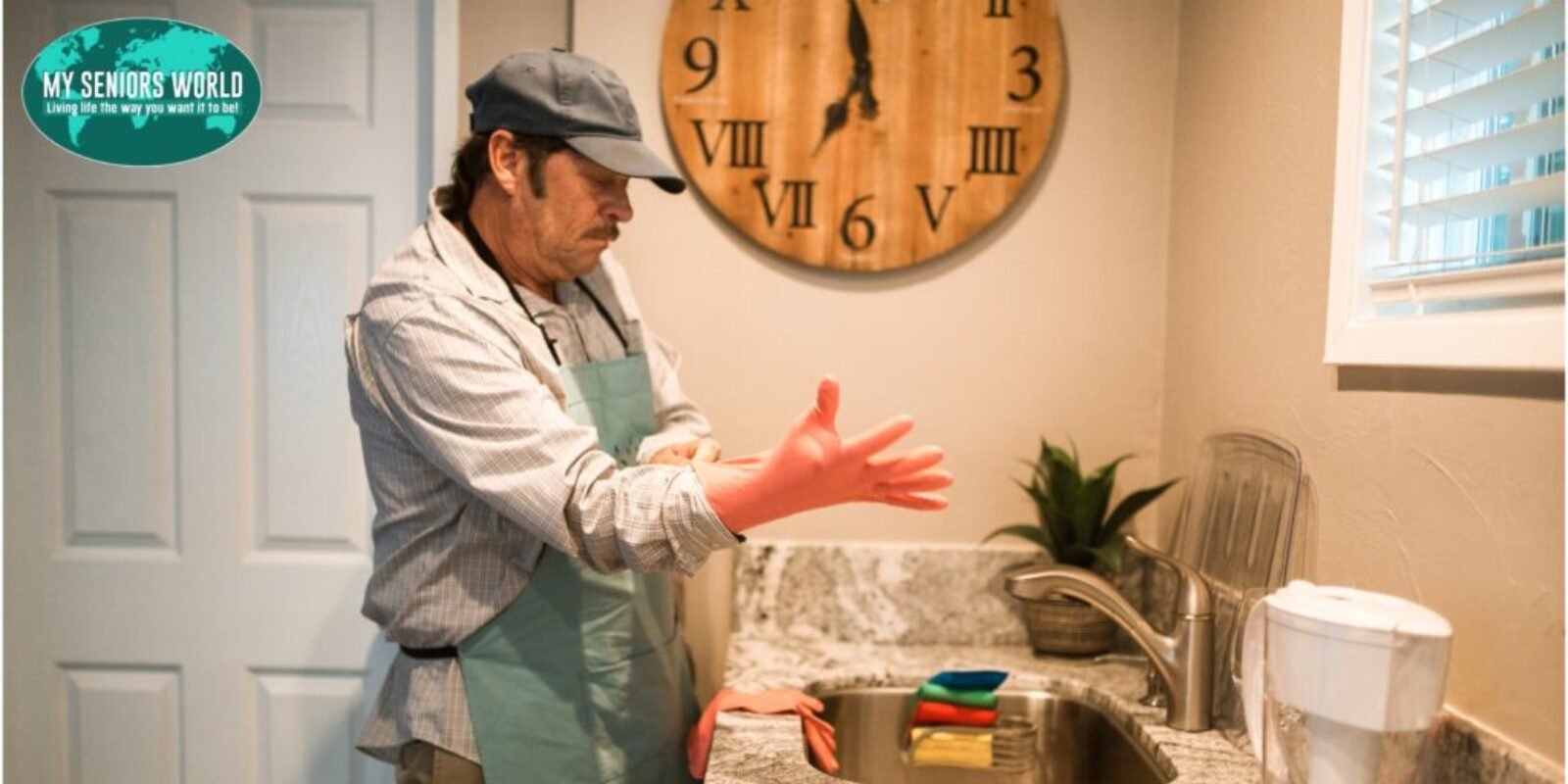Last Updated on July 3, 2025 by Rose Ann Palac
Are you ready to transform your living space into a sanctuary that supports your health, safety, and peace of mind? Maintaining a clean and organized home doesn’t have to feel overwhelming or exhausting—especially when you have the right strategies tailored specifically for your lifestyle.
This comprehensive guide reveals practical, enjoyable ways to keep your home sparkling clean without straining your back, budget, or energy levels. You’ll discover lightweight cleaning tools that make the job effortless, simple organizational systems that prevent clutter from taking over, and smart scheduling tricks that break big tasks into manageable daily habits.
We’ll explore why a clean home is particularly important for mature adults—from reducing allergens that can trigger respiratory issues to eliminating trip hazards that could lead to falls. You’ll learn about game-changing tools like robot vacuums and long-handled dusters that make cleaning safer and more comfortable, plus discover storage solutions that put everything within easy reach.
Whether you’re looking to declutter one room at a time, create a sustainable cleaning routine, or simply make your home safer and more comfortable, this guide offers proven strategies that actually work. Best of all, many of these tips will help you turn cleaning from a dreaded chore into an activity you might actually enjoy—complete with music, movement, and the satisfaction of creating a space that truly feels like home.
Ready to discover how simple changes can make a world of difference in your daily comfort and independence?
Why Keeping Your Home Clean Matters for Seniors
Let’s be honest—cleaning might not always top your list of favorite activities. But maintaining a clean home goes far beyond appearances. It’s about creating an environment that actively supports your health, safety, and mental clarity.
1. Healthier, Happier You!
A clutter-free, regularly cleaned space significantly reduces dust, allergens, and airborne irritants that can trigger respiratory issues. This is particularly important if you have allergies, asthma, or other breathing concerns. Better air quality in your home can reduce allergy and asthma triggers, making it easier to breathe comfortably in your own space.
Regular dusting, vacuuming, and maintaining proper humidity levels (below 50%) help prevent mold growth and minimize common allergens like dust mites and pet dander.
2. Say Goodbye to Stress
Have you ever noticed how a cluttered space can make your mind feel cluttered too? There’s actual science behind this feeling. A messy environment can increase stress hormones and make it harder to concentrate or relax. When everything has its place and surfaces are clear, many people report feeling more mentally organized and peaceful.
You won’t waste time searching for important documents, medications, or household items. This mental peace translates into less anxiety and more time to enjoy activities that bring you joy.
3. Safety First, Always!
More than 14 million adults in the United States fall each year, and many of these accidents happen at home due to environmental hazards. More than 95,000 adults are hospitalized each year as a result of a fall injury.
Keeping floors clear of clutter, ensuring good lighting, and maintaining organized storage areas dramatically reduces your risk of trips, slips, and falls. This isn’t about limiting your independence—it’s about protecting it.

Prefer to listen rather than read?
10 Super Easy House Cleaning Tips for Seniors (That You’ll Actually Enjoy!)
Now, let’s get down to business! These cleaning tips are simple, eReady to transform your cleaning routine? These practical strategies are designed to make maintaining your home easier, safer, and more enjoyable.
ffective, and designed to make your life easier (and a little bit more fun)! Whether you’re cleaning solo or with some help, these tricks will make it a whole lot easier.
Use Light, Easy-to-Handle Tools
Heavy vacuum cleaners and awkward cleaning supplies can turn a simple task into an exhausting ordeal. Instead, invest in lightweight, ergonomic tools that make cleaning effortless.
Cordless vacuums are perfect because they’re easy to maneuver and don’t require constant plugging and unplugging. If traditional mopping feels challenging, a Swiffer-style mop requires no heavy bucket and wrings itself.
Consider a robot vacuum for daily floor maintenance—you can set it to clean while you enjoy your morning coffee or watch your favorite show. These devices have become incredibly affordable and effective.
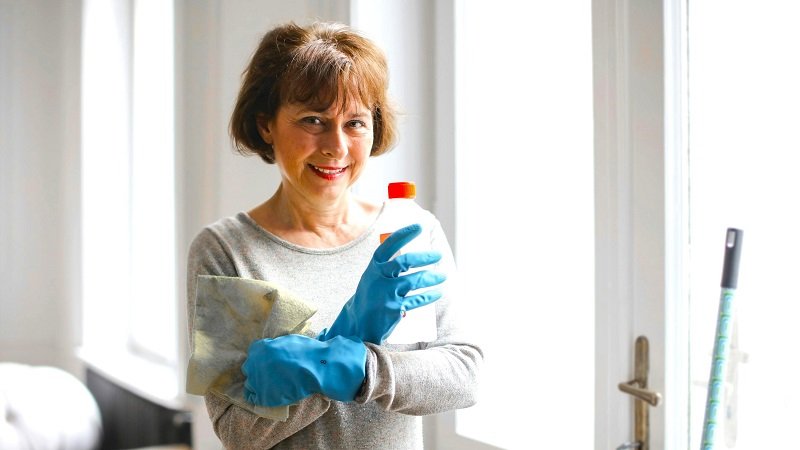
Declutter One Room at a Time
Trying to organize your entire home in one day is a recipe for frustration and exhaustion. Instead, focus on one room—or even one area of a room—at a time.
Start with the spaces you use most frequently, like your living room or kitchen. As you sort through items, ask yourself: “Have I used this in the past year? Does it bring me joy or serve a practical purpose?” Be honest with your answers.
Keep a donation box in each room and add items throughout the week. This prevents clutter from accumulating and makes regular decluttering feel effortless.
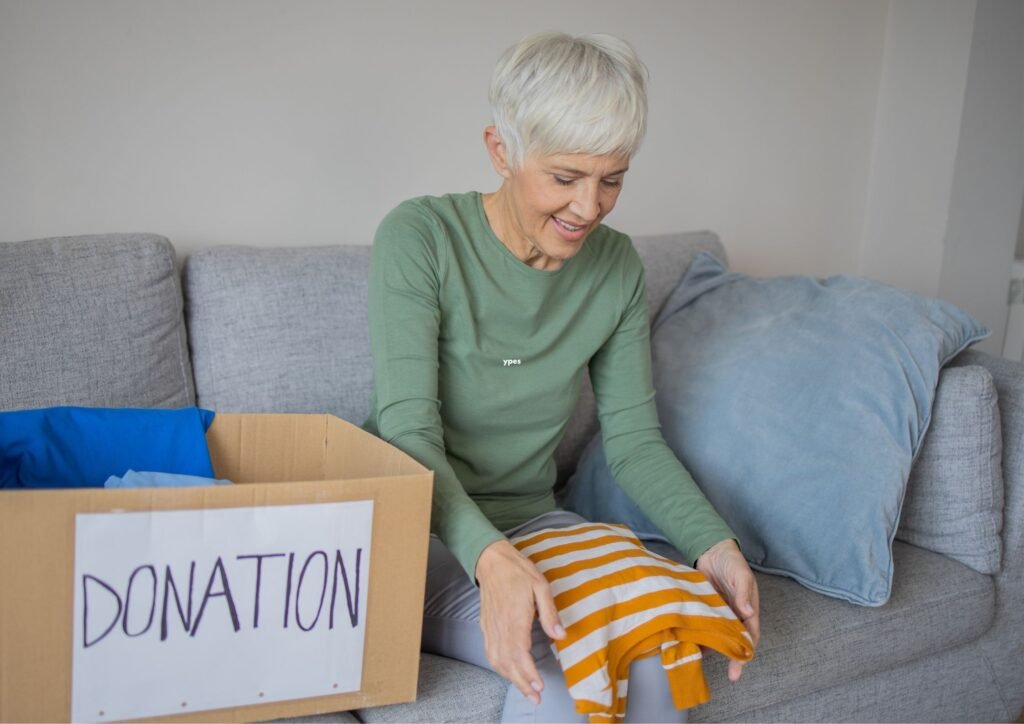
Create a Cleaning Schedule You Can Stick To
Consistency beats intensity every time. Rather than marathon cleaning sessions that leave you exhausted, develop a routine with small, manageable daily tasks.
Having a cleaning routine also means you won’t need to spend hours cleaning at once—it’s all about breaking it up into small, manageable tasks. Set yourself up for success by sticking to a regular schedule!
- Daily
- Daily cleaning tasks to maintain a clean and organized home include making the bed, wiping down kitchen counters, washing dishes, sweeping floors, and taking out the trash.
- Weekly
- Weekly cleaning tasks may include dusting furniture, vacuuming carpets, mopping floors, cleaning the bathroom, and changing bed sheets.
- Monthly
- Include wiping appliances, cleaning windows, sanitizing trash cans, and decluttering closets in your monthly cleaning routine.
- Seasonal
- Achieve a clean and organized home by completing seasonal cleaning tasks, including washing curtains, deep cleaning the oven, flipping the mattress, and organizing the garage.
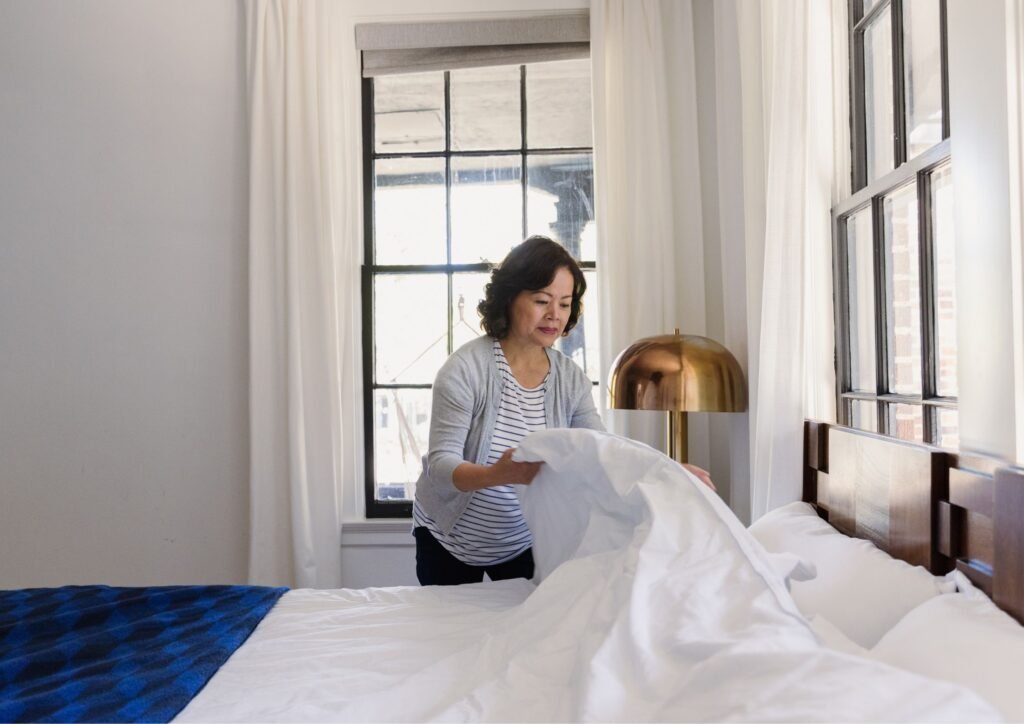
You can also use a cleaning checklist or app to keep track of your tasks and remind yourself what needs to be done. An extremely helpful reminder app that I use is called To Do Reminder. Try an ad-supported free version or buy the pro version for a couple of dollars. This and similar apps can be found in the various app stores.
Store Cleaning Products in a Caddy
Let’s be real—finding cleaning products all over the house is a hassle! Keep things organized by storing your cleaners in a portable caddy. You can easily grab it and move from room to room without having to search through cabinets for what you need. Plus, using a multi-purpose cleaner means fewer products to juggle, making it even easier to get the job done!
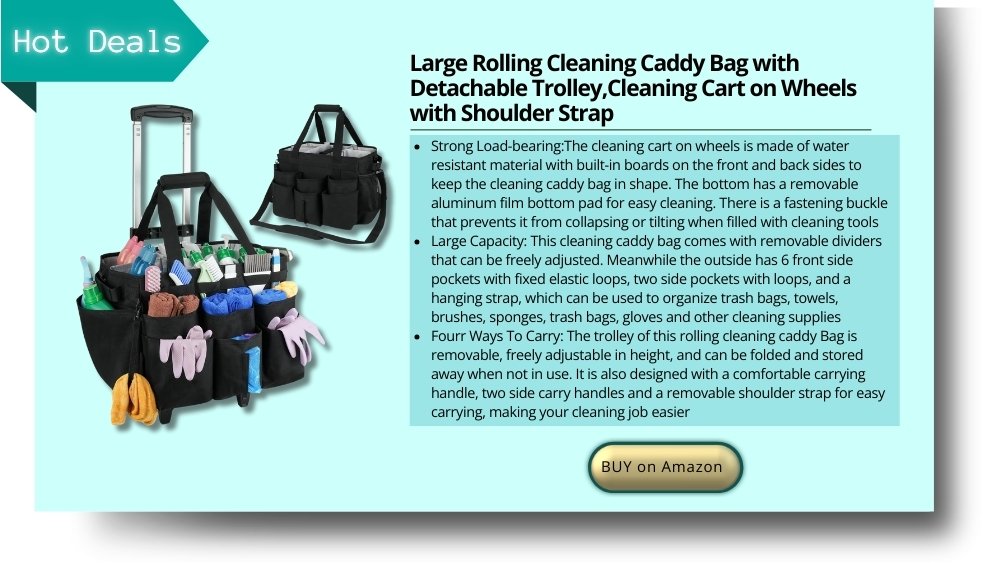
Keep Cleaning Supplies Close to Their Work Zones
Searching for cleaning products throughout your home wastes time and energy. Create a portable cleaning caddy with your essential supplies: multi-surface cleaner, microfiber cloths, glass cleaner, and disinfectant.
Better yet, store cleaning supplies in the rooms where they’ll be used most. Keep bathroom cleaners in the bathroom cabinet and kitchen cleaners under the kitchen sink. This eliminates unnecessary trips around the house.
Try Long-Handled Cleaning Tools
Bending, reaching, and stretching can be uncomfortable or even unsafe. Long-handled dusters, mops, and cleaning tools allow you to clean effectively while maintaining good posture and balance.
These tools are especially helpful for cleaning ceiling fans, high shelves, baseboards, and areas under furniture. They reduce strain on your back and knees while helping you maintain your balance.
Never Leave Dirty Dishes in the Kitchen or Kitchen Sink
The kitchen often becomes the most challenging room to keep organized. Prevent overwhelming cleanup by washing dishes or loading the dishwasher immediately after each meal.
Wipe down counters and stovetops while you’re cooking, and put ingredients away as soon as you’re finished with them. This approach keeps your kitchen ready for the next meal and prevents the buildup of overwhelming messes.
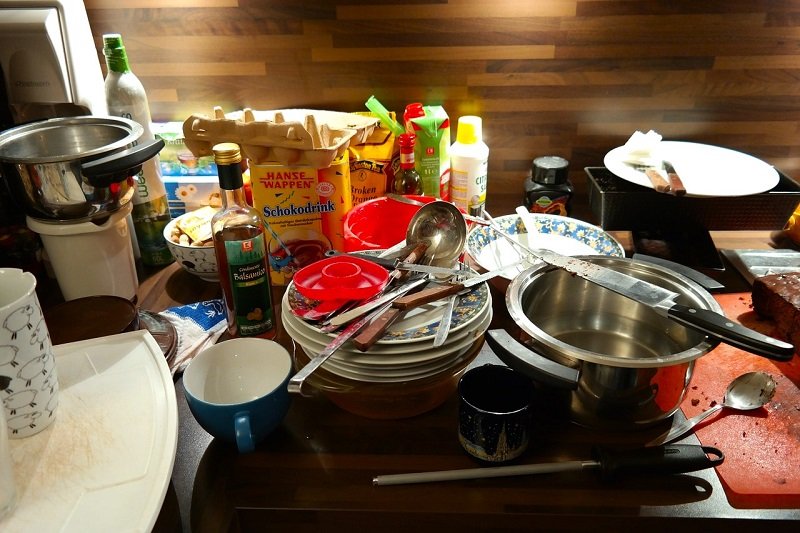
Remove Shoes Before Entering Your Home
Removing shoes at the entrance significantly reduces the amount of dirt, bacteria, and outdoor allergens that enter your living space. This simple habit protects your floors and carpets while keeping your home cleaner longer.
Place a attractive shoe rack or basket near your entrance and consider keeping comfortable house slippers nearby for guests.
Keep Your Floors Clutter-Free
Floor clutter isn’t just unsightly—it’s dangerous. One out of every three seniors falls each year, and every 11 seconds, an adult is treated in an emergency room for a fall.
Keep all walkways clear of obstacles, secure loose rugs with non-slip backing, and ensure electrical cords are tucked away safely. Good lighting in hallways and stairwells is equally important for preventing accidents.
If All Else Fails, Hire Cleaning Help
There’s no shame in getting assistance with tasks that have become challenging or time-consuming. Whether it’s a family member helping with seasonal deep cleaning, a friend lending a hand with organization, or a professional cleaning service handling the heavy-duty work, support allows you to focus on what you can comfortably manage.
Many communities offer senior-friendly services, and some cleaning companies specialize in working with mature adults who want to maintain their independence.

How to Keep Your House Organized Without Overwhelming Yourself
Now that we’ve got cleaning covered, let’s talk about organization! Keeping your house organized helps make cleaning easier and keeps you from feeling overwhelmed. Here’s how you can keep things neat without too much effort:
- Go Vertical
- If you have limited space, think about using vertical space! Shelving units, hooks, and tall storage bins are perfect for organizing books, shoes, and knick-knacks. This helps free up floor space and gives you more room to move around.
- Use Clear Storage Bins
- Clear storage bins let you see what’s inside without opening them. Label each bin so you can easily find what you need. Store similar items together, and be sure to place heavier bins at the bottom to avoid accidents.
- Donate Regularly
- Over time, we accumulate things we don’t really need. Make it a habit to donate items you no longer use. Regular decluttering will keep your home organized and prevent unnecessary items from piling up.
- Over time, we accumulate things we don’t really need. Make it a habit to donate items you no longer use. Regular decluttering will keep your home organized and prevent unnecessary items from piling up.
Making Cleaning Enjoyable Instead of Exhausting
Ready to transform your relationship with housework? Try these mood-boosting strategies:
- Create an Upbeat Playlist: Music makes everything more enjoyable. Choose songs that energize you or bring back happy memories.
- Set Timer Challenges: Challenge yourself to complete small tasks in 10-15 minutes. You’ll be amazed at what you can accomplish in short bursts.
- Reward Your Efforts: After completing cleaning tasks, treat yourself to something enjoyable—a cup of tea, a favorite TV show, or time with a hobby.
- Clean During Favorite Programs: Light cleaning tasks like dusting or organizing can be done while watching television or listening to audiobooks.
Final Thoughts: Keeping Your House Clean and Organized Should Be Fun, Not a Chore!
Your home should be a place where you feel comfortable, safe, and proud to welcome others. With these practical strategies, you can maintain a clean, organized space that supports your independence and enhances your daily enjoyment.
Are you ready to try one of these cleaning strategies this week? Which tip do you think would make the biggest difference in your daily routine? Share your thoughts and experiences in the comments below—we’d love to hear which approaches work best for you!
Frequently Asked Questions on How to Keep Your House Clean and Organized
How often should I clean different areas of my home?
- Daily tasks include making beds, wiping kitchen counters, and quick tidying. Weekly tasks should include vacuuming main areas, dusting, and bathroom cleaning. Monthly deep cleaning can focus on appliances, windows, and organizing one specific area. The key is consistency rather than perfection.
- What are the best lightweight cleaning tools for mature adults?
- Cordless vacuums, Swiffer-style mops, long-handled dusters, and robot vacuums are excellent choices. Look for tools with ergonomic handles and avoid anything that requires heavy lifting or awkward positioning.
- How can I prevent falls while cleaning?
- Use long-handled tools to avoid bending and reaching, ensure good lighting in all areas, wear non-slip footwear, and never stand on chairs or unstable surfaces. Keep cleaning supplies organized to avoid multiple trips up and down stairs.
- Is it worth hiring professional cleaning help?
- Professional help can be valuable for tasks that have become physically challenging, such as deep cleaning bathrooms, washing windows, or seasonal cleaning. Many services offer flexible scheduling and can work around your preferences and budget.
- How do I maintain motivation for regular cleaning?
- Start with small, manageable tasks and celebrate completing them. Create pleasant associations by playing music or cleaning during favorite TV shows. Focus on how good you feel in a clean, organized space rather than viewing cleaning as a chore.
- What’s the most important room to keep clean for health and safety?
- The kitchen and bathroom are priorities for hygiene, while keeping floors and walkways clear throughout the home is crucial for preventing falls. However, every room benefits from regular attention to dust and clutter control.
- How can I organize cleaning supplies efficiently?
- Use a portable caddy for supplies you use throughout the house, and store room-specific cleaners in those rooms. Choose multi-purpose cleaners to reduce the number of products you need to manage.
- What should I do with items I want to declutter?
- Create three categories: donate, sell, and discard. Keep a donation box in each room for ongoing decluttering. Items in good condition might be sold online or at consignment shops for extra income.
REFERENCES
- Mayo Clinic. (2024, September 20). Allergy-proof your home. Retrieved from https://www.mayoclinic.org/diseases-conditions/allergies/in-depth/allergy/art-20049365
- American Lung Association. Cleaning Supplies and Household Chemicals. Retrieved from https://www.lung.org/clean-air/indoor-air/indoor-air-pollutants/cleaning-supplies-household-chem
- Honey Bee Cleaning. (2024, June 7). 5 Surprising Health Benefits of a Clean Home You Need to Know. Retrieved from https://honeybeecleaning.ca/5-surprising-health-benefits-of-a-clean-home-you-need-to-know/
- Asthma and Allergy Foundation of America. (2025, January 16). Control Indoor Allergens to Improve Indoor Air Quality. Retrieved from https://aafa.org/allergies/prevent-allergies/control-indoor-allergens/
- Centers for Disease Control and Prevention. (2024, June 10). Facts About Falls. Retrieved from https://www.cdc.gov/falls/data-research/facts-stats/index.html
- California Caregiver Resource Centers. (2024, September 13). Fall Prevention Month: Creating a Safe Home Environment for Seniors with Mobility Issues. Retrieved from https://www.caregivercalifornia.org/2024/09/12/fall-prevention-month-creating-a-safe-home-environment-for-seniors-with-mobility-issues/
- HelpGuide. (2024, August 12). Older Adult Fall Statistics and Facts In 2024. Retrieved from https://www.helpguide.org/handbook/medical-alert-systems/fall-statistics
- Age Safe America. (2017, January 26). Home Safety for Seniors – Statistics and Solutions. Retrieved from https://agesafeamerica.com/home-safety-seniors-statistics-solutions/
